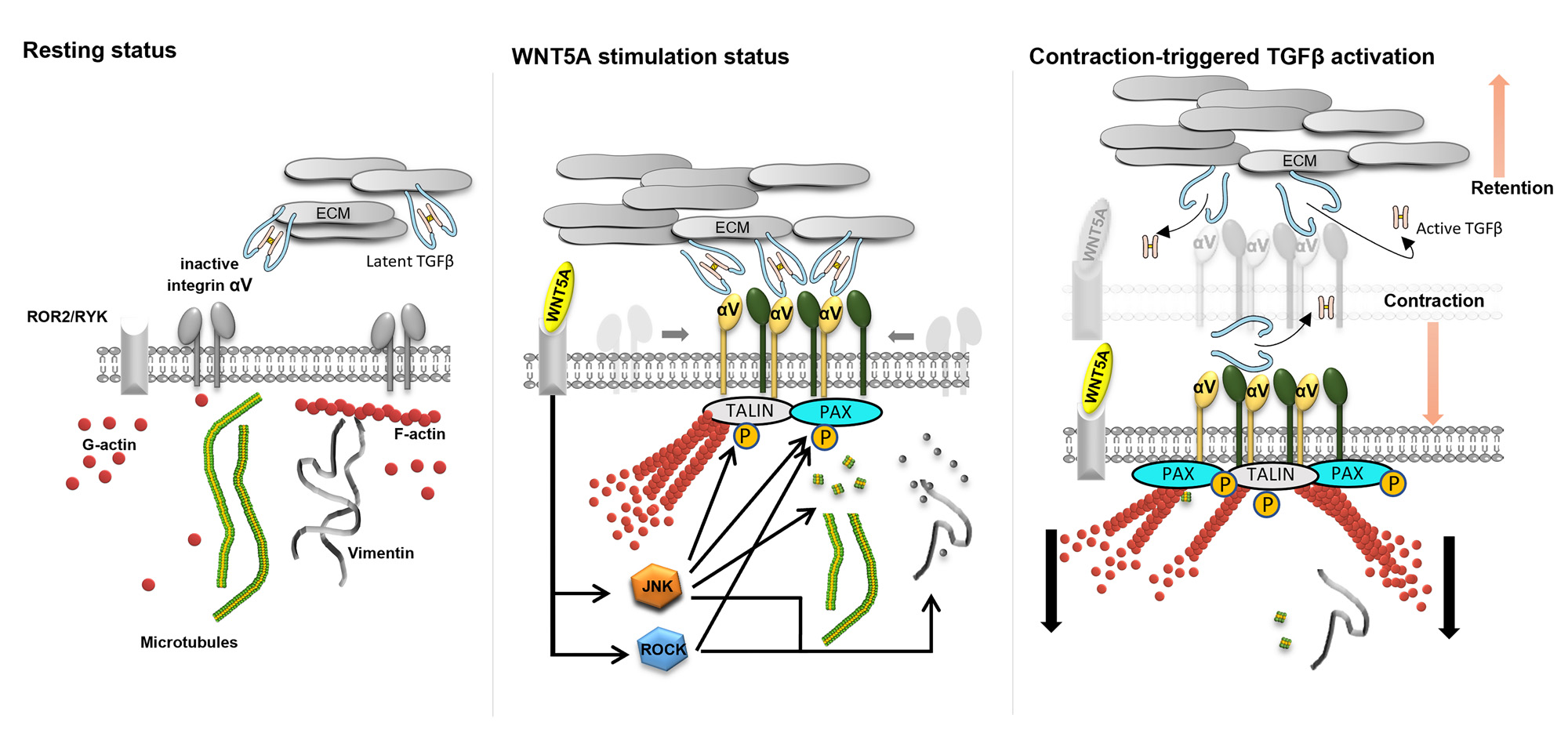Session Information
Date: Monday, November 13, 2023
Title: (0934–0964) Systemic Sclerosis & Related Disorders – Basic Science Poster
Session Type: Poster Session B
Session Time: 9:00AM-11:00AM
Background/Purpose: Systemic sclerosis (SSc) is a chronic autoimmune disorder with vasculopathy, inflammation, and fibrosis of the skin and organs. Fibrosis is caused by the abnormal activation of latent transforming growth factor beta (TGFβ) by fibroblasts, resulting in excessive extracellular matrix and tissue damage. WNT5A is a non-canonical WNT ligand which significantly expresses higher in fibrotic diseases. We aimed to investigate the role of WNT5A and its downstream intracellular signaling and gene expression in fibroblast activation in SSc and other fibrotic diseases. We also tested the effect of blocking WNT5A downstream targets on latent TGFβ activation and fibrosis.
Methods: We performed bulk RNA sequencing (RNAseq) of WNT5A-stimulated fibroblasts with or without pretreatment with inhibitors of potential downstream mediators of WNT5A (small molecule inhibitors against JNK, ROCK, integrin alpha V – ITGAV, TGFβR1 and actin polymerization). To confirm the findings, we treated WNT5A-overexpressing mice with those inhibitors. We quantified the active TGFβ level in vitro and in vivo by transformed mink lung epithelial cells assays. The contraction force and cellular stiffness of WNT5A-stimulated fibroblasts were analyzed by 3D microtissue assays and magnetic tweezers. Formation of focal adhesions (FAs) and cytoskeleton rearrangement were evaluated by Western blot, IF staining, and live-cell imaging.
Results: 38% of DEGs of a cohort of patients with early, diffuse-cutaneous SSc (PRESS1) matched the genes regulated by WNT5A in cultured fibroblasts. Ubiquitous knockout of WNT5A or fibroblast-specific knockout of WNT5A are protected from experimental fibrosis. RNAseq of fibroblasts treated with respective inhibitors revealed 75% of the WNT5A-regulated DEGs were regulated by JNK- and ROCK-dependent manner. Functional analysis of the DEGs indicated that WNT5A regulates TGFβ signaling, FAs, integrin activation and cytoskeleton organization. Indeed, WNT5A induced the formation of FAs with increased levels of p-Talin and p-Paxillin, ITGAV clustering and cytoskeletal rearrangement involving Vimentin, actin filaments, and microtubules. All of these changes were dependent on the activation of latent TGFβ, which was strongly induced by WNT5A in cultured fibroblasts. Pharmacological inhibition of JNK, ROCK, TGFβR1, ITGAV, or actin polymerization blocked the activation of latent TGFβ, reduced cellular stiffening, prevented integrin activation, and in particular reduced fibroblast-to-myofibroblast transition and collagen deposition in cultured fibroblasts. Moreover, Pharmacological inhibition of the downstream mediators also reduced the levels of active TGFβ and fibrotic remodeling of skin in mice overexpressing WNT5A.
Conclusion: We demonstrate that WNT5A/JNK/ROCK signaling axis regulates the activation of latent TGFβ by induction of cytoskeletal rearrangement, cellular tension forces and clustering of ITGAV. Blocking of WNT5A or its downstream pathways prevents the aberrant activation of latent TGFβ in experimental fibrosis, prevents fibroblast-to-myofibroblast transition and tissue fibrosis. Targeting of WNT5A may thus offer potential for novel antifibrotic therapies.
To cite this abstract in AMA style:
Trinh-Minh T, Chen C, Tran Manh C, Li y, Zhu H, Chakraborty D, Zhang Y, Rauber S, Dees C, Bergmann C, Kreuter A, Reuter C, Groeber-Becker F, Eckes B, Distler O, Ramming A, Schett G, Distler J. Non-canonical WNTA Promotes Cytoskeletal Rearrangement and Integrin Alpha V Clustering via JNK and ROCK to Control the Activation of Latent TGFβ [abstract]. Arthritis Rheumatol. 2023; 75 (suppl 9). https://acrabstracts.org/abstract/non-canonical-wnta-promotes-cytoskeletal-rearrangement-and-integrin-alpha-v-clustering-via-jnk-and-rock-to-control-the-activation-of-latent-tgf%ce%b2/. Accessed .« Back to ACR Convergence 2023
ACR Meeting Abstracts - https://acrabstracts.org/abstract/non-canonical-wnta-promotes-cytoskeletal-rearrangement-and-integrin-alpha-v-clustering-via-jnk-and-rock-to-control-the-activation-of-latent-tgf%ce%b2/

